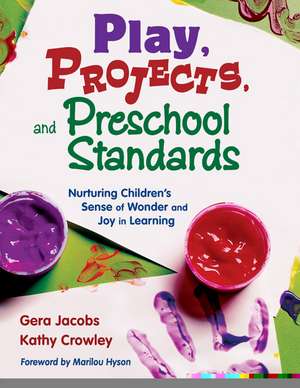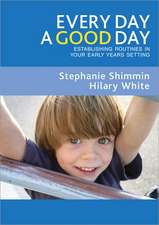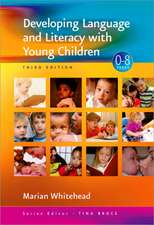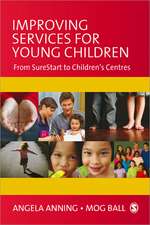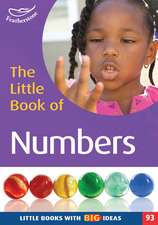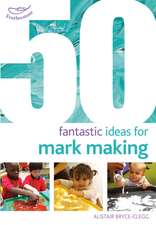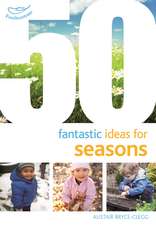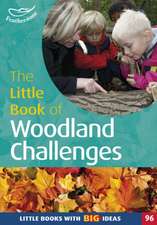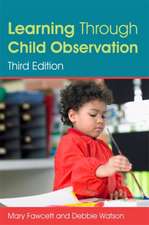Play, Projects, and Preschool Standards: Nurturing Children's Sense of Wonder and Joy in Learning
Autor Gera Jacobs, Kathleen E. Crowleyen Limba Engleză Paperback – 17 ian 2007
· Connecting popular projects and themes with standards and benchmarks
· Suggestions for designing optimal learning environments and motivating materials
· Snapshots of "What Research and the Experts Say" and how it applies to practice
· "Try This" activity ideas that put standards and benchmarks into practice
· Suggestions for tailoring activities to meet the needs of English language learners and children with special needs
The final chapter ties all of the information together, and offers suggestions to support children's transition to kindergarten. An extensive resources section provides sample observation and assessment tools, helpful websites, a list of excellent children's books and songs, and more. Beginning and veteran preschool teachers will benefit from this user-friendly guide to meeting high-quality standards through joyful learning experiences.
| Toate formatele și edițiile | Preț | Express |
|---|---|---|
| Paperback (1) | 240.17 lei 6-8 săpt. | |
| SAGE Publications – 17 ian 2007 | 240.17 lei 6-8 săpt. | |
| Hardback (1) | 538.21 lei 6-8 săpt. | |
| SAGE Publications – 8 ian 2007 | 538.21 lei 6-8 săpt. |
Preț: 240.17 lei
Nou
Puncte Express: 360
Preț estimativ în valută:
45.96€ • 47.81$ • 37.94£
45.96€ • 47.81$ • 37.94£
Carte tipărită la comandă
Livrare economică 15-29 aprilie
Preluare comenzi: 021 569.72.76
Specificații
ISBN-13: 9781412928021
ISBN-10: 1412928028
Pagini: 176
Dimensiuni: 216 x 279 x 11 mm
Greutate: 0.5 kg
Ediția:1
Editura: SAGE Publications
Colecția Corwin
Locul publicării:Thousand Oaks, United States
ISBN-10: 1412928028
Pagini: 176
Dimensiuni: 216 x 279 x 11 mm
Greutate: 0.5 kg
Ediția:1
Editura: SAGE Publications
Colecția Corwin
Locul publicării:Thousand Oaks, United States
Recenzii
"A wonderful, richly detailed book that presents children as lively, engaged learners. Successfully communicates standards and benchmarks in familiar, matter-of-fact ways that support young children’s growth and learning and that are aligned with good developmental practice. The sections on second language learners and children with individual needs are important reminders that these children too are part of our classrooms and that one-size-fits-all teaching doesn’t benefit anyone."
"The ideas in this book will seem familiar and non-threatening—yes, teachers can indeed use what they already know and what their children love, but they can also enhance and expand their favorite activities, enriching the educational benefits of everyday experiences."
"Preschool teachers and daycare centers concerned with early education receive an excellent survey based on expert insights that provide a variety of projects and activities to enhance early learning in all curriculum areas. This is a workbook of ideas pairing benchmark standards to realistic activities."
"The ideas in this book will seem familiar and non-threatening—yes, teachers can indeed use what they already know and what their children love, but they can also enhance and expand their favorite activities, enriching the educational benefits of everyday experiences."
"Preschool teachers and daycare centers concerned with early education receive an excellent survey based on expert insights that provide a variety of projects and activities to enhance early learning in all curriculum areas. This is a workbook of ideas pairing benchmark standards to realistic activities."
Cuprins
Foreword by Marilou Hyson
Preface
Acknowledgments
About the Authors
1. Addressing Preschool Standards in Developmentally Appropriate Ways
Defining the Standards
Meeting the Needs of All Children
Addresssing Standards Through Engaging Experiences and Activities
Assessing Progress Toward Meeting the Standards
Summary
2. Designing the Environment With the Child in Mind
Creating a Welcoming Environment
Building Relationships
The Power of Choice
Arranging the Room for Exploration and Learning
Materials for Creating Engaging Interest Areas
Scheduling the Day for Play and Learning
Summary
3. Developing Positive Approaches to Learning and Social-Emotional Development
Developing Curiosity and Eagerness; Initiative and Persistence; Problem Solving and Reflection; Invention and Imagination; Self-Concept and Self-Confidence; Regulating Emotions; Respect and Appreciation; and Pro-Social Behaviors and Cooperation
Sample Early Learning Guidelines for Approaches to Learning
Sample Early Learning Guidelines for Social-Emotional Development
Developing Positive Approaches to Learning and Social-Emotional Development Through Projects
Designing the Environment
Addressing Standards Through Engaging Experiences and Activities
Supporting Children Who Are Bilingual Learners
Working With Children's Individual Needs
Summary
4. Exploring the World Through Science
Sample Early Learning Guidelines for Science
Science as Inquiry; Physical Science; Life Science; Earth and Space Science; Science and Technology; Science, Environment, and Society
Exploring the World and Science Through Projects
Designing the Environment
Addressing Standards Through Engaging Experiences and Activities
Supporting Children Who Are Bilingual Learners
Working With Children's Individual Needs
Summary
5. Learning About Our Community Through Social Studies
Families/Cultures; Community/Civics; History/Time; Geography/Places, People, and Environments; and Economics
Sample Early Learning Guidelines for Social Studies
Learning About Our Community and Social Studies Through Projects
Designing the Environment
Addressing Standards Through Engaging Experiences and Activities
Supporting Children Who Are Bilingual Learners
Working With Children's Individual Needs
Summary
6. Engaging Children in Meaningful Literacy
Reading; Writing; Listening and Phonological Awareness; Speaking/Communicating and Oral Language Development; and Learning New Languages
Sample Early Learning Guidelines for Language and Literacy
Engaging Children in Meaningful Literacy Through Projects
Designing the Environment
Addressing Standards Through Engaging Experiences and Activities
Supporting Children Who Are Bilingual Learners
Working With Children's Individual Needs
Summary
7. Making Mathematics Inviting
Number Sense and Operations; Shapes/Geometry; Measurement; Data Analysis and Probability; and Patterns/Algebra
Sample Early Learning Guidelines for for Mathematics
Making Mathematics Meaningful Through Projects
Designing the Environment
Addresssing Standards Through Engaging Experiences and Activities
Supporting Children Who Are Bilingual Learners
Working With Children's Individual Needs
Summary
8. Fostering Creativity Through the Arts
Visual Arts; Music; Creative Movement; and Dramatic Play
Sample Early Learning Guidelines for Creative Arts
Fostering Creativity in the Arts Through Projects
Designing the Environment
Addressing Standards Through Engaging Experience and Activities
Supporting Children Who Are Bilingual Learners
Working With Children's Individual Needs
Summary
9. Promoting Physical Development and Healthy Lifestyles
Gross Motor; Fine Motor; and Health and Safety
Sample Early Learning Guidelines for Physical Development and Health
Promoting Physcial Development and Healthy Lifestyles Through Projects
Designing the Environment
Addressing Standards Through Engaging Experiences and Activities
Supporting Children Who Are Bilingual Learners
Working With Children's Individual Needs
Summary
10. Putting It All Together
Addressing Standards in Developmentally Appropriate Ways
Addressing Standards and Benchmarks Through Projects, Studies, and Themes
Supporting the Transition to Kindergarten
Final Thoughts
Resources
Sample Signs for Interest Areas
Assessing Children's Progress Toward Standards
Sample Group Observation Tool for Language and Literacy
Sample Individual Child Observation Tool for Language and Literacy
Children's Books and Music
Resources for Teaching Bilingual Learners
Assessment Materials
Helpful Websites
References
For Further Reading
Index
Preface
Acknowledgments
About the Authors
1. Addressing Preschool Standards in Developmentally Appropriate Ways
Defining the Standards
Meeting the Needs of All Children
Addresssing Standards Through Engaging Experiences and Activities
Assessing Progress Toward Meeting the Standards
Summary
2. Designing the Environment With the Child in Mind
Creating a Welcoming Environment
Building Relationships
The Power of Choice
Arranging the Room for Exploration and Learning
Materials for Creating Engaging Interest Areas
Scheduling the Day for Play and Learning
Summary
3. Developing Positive Approaches to Learning and Social-Emotional Development
Developing Curiosity and Eagerness; Initiative and Persistence; Problem Solving and Reflection; Invention and Imagination; Self-Concept and Self-Confidence; Regulating Emotions; Respect and Appreciation; and Pro-Social Behaviors and Cooperation
Sample Early Learning Guidelines for Approaches to Learning
Sample Early Learning Guidelines for Social-Emotional Development
Developing Positive Approaches to Learning and Social-Emotional Development Through Projects
Designing the Environment
Addressing Standards Through Engaging Experiences and Activities
Supporting Children Who Are Bilingual Learners
Working With Children's Individual Needs
Summary
4. Exploring the World Through Science
Sample Early Learning Guidelines for Science
Science as Inquiry; Physical Science; Life Science; Earth and Space Science; Science and Technology; Science, Environment, and Society
Exploring the World and Science Through Projects
Designing the Environment
Addressing Standards Through Engaging Experiences and Activities
Supporting Children Who Are Bilingual Learners
Working With Children's Individual Needs
Summary
5. Learning About Our Community Through Social Studies
Families/Cultures; Community/Civics; History/Time; Geography/Places, People, and Environments; and Economics
Sample Early Learning Guidelines for Social Studies
Learning About Our Community and Social Studies Through Projects
Designing the Environment
Addressing Standards Through Engaging Experiences and Activities
Supporting Children Who Are Bilingual Learners
Working With Children's Individual Needs
Summary
6. Engaging Children in Meaningful Literacy
Reading; Writing; Listening and Phonological Awareness; Speaking/Communicating and Oral Language Development; and Learning New Languages
Sample Early Learning Guidelines for Language and Literacy
Engaging Children in Meaningful Literacy Through Projects
Designing the Environment
Addressing Standards Through Engaging Experiences and Activities
Supporting Children Who Are Bilingual Learners
Working With Children's Individual Needs
Summary
7. Making Mathematics Inviting
Number Sense and Operations; Shapes/Geometry; Measurement; Data Analysis and Probability; and Patterns/Algebra
Sample Early Learning Guidelines for for Mathematics
Making Mathematics Meaningful Through Projects
Designing the Environment
Addresssing Standards Through Engaging Experiences and Activities
Supporting Children Who Are Bilingual Learners
Working With Children's Individual Needs
Summary
8. Fostering Creativity Through the Arts
Visual Arts; Music; Creative Movement; and Dramatic Play
Sample Early Learning Guidelines for Creative Arts
Fostering Creativity in the Arts Through Projects
Designing the Environment
Addressing Standards Through Engaging Experience and Activities
Supporting Children Who Are Bilingual Learners
Working With Children's Individual Needs
Summary
9. Promoting Physical Development and Healthy Lifestyles
Gross Motor; Fine Motor; and Health and Safety
Sample Early Learning Guidelines for Physical Development and Health
Promoting Physcial Development and Healthy Lifestyles Through Projects
Designing the Environment
Addressing Standards Through Engaging Experiences and Activities
Supporting Children Who Are Bilingual Learners
Working With Children's Individual Needs
Summary
10. Putting It All Together
Addressing Standards in Developmentally Appropriate Ways
Addressing Standards and Benchmarks Through Projects, Studies, and Themes
Supporting the Transition to Kindergarten
Final Thoughts
Resources
Sample Signs for Interest Areas
Assessing Children's Progress Toward Standards
Sample Group Observation Tool for Language and Literacy
Sample Individual Child Observation Tool for Language and Literacy
Children's Books and Music
Resources for Teaching Bilingual Learners
Assessment Materials
Helpful Websites
References
For Further Reading
Index
Notă biografică
Gera Jacobs is a professor of early childhood education and taught kindergarten, preschool, and the elementary grades for many years. She has published articles in a number of national and regional journals and produced a CD-ROM on inclusion for young children with special needs. She has presented at numerous state, regional, and national conferences, and has conducted many inservice presentations for teachers. She is a member of the National Association for the Education of Young Children (NAEYC) Governing Board and served on the NAEYC Affiliate Council. The Carnegie Corporation named her the South Dakota Professor of the Year in 2002. She was chairperson of the South Dakota Early Learning Guidelines Panel, responsible for writing the preschool standards for South Dakota.
Jacobs and her coauthor Kathy Crowley have helped to organize an annual statewide kindergarten academy for many years in South Dakota and have presented at kindergarten institutes in other states. They are the coauthors of Play, Projects, and Preschool Standards: Nurturing Children¿s Sense of Wonder and Joy in Learning, published by Corwin Press and winner of a 2008 Teachers¿ Choice Award, sponsored by Learning Magazine, and a 2007 Distinguished Achievement Award from the Association of Educational Publishers. Their collaboration began many years ago as team-teachers in a kindergarten classroom.
Descriere
The authors help readers create well-planned projects and activities that capture children's interest and develop the critical social and pre-academic skills identified in state standards.
